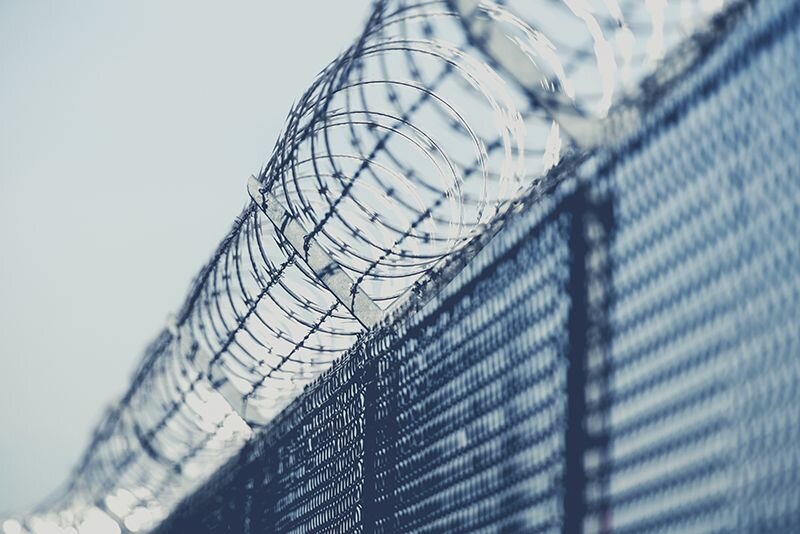
A culture that disposes of humans. And how one relationship at a time interrupts it.
MASS INCARCERATION
You’ve heard the phrase a lot by now. What does it mean?
2 million humans in America are incarcerated. Check out the graph below for how this compares to other nations.
We have a massive problem with throwing human beings away. Our human dumpster system has become unsustainable.
Jesus calls his followers to practice resurrection. With 2 million fellow humans buried in a human landfill system, how do we practice that as Christians today?
Now that we know somebody who’s underground, deep inside that system, it is essential for us to learn about the larger history behind it. We learn the history of the “tomb system,” so to say, that we are approaching as a team. We get more familiar with the institutional “stones” we will help roll away between us and the Lazarus hoping to come back to the land of the living.
Luckily, our nation is waking up to this mass error of ours—both liberals and conservatives. So there’s a wealth of material coming out to illustrate the history.
Take some time this month to watch these three videos. They are outstanding.
Use the questions at the bottom for discussion.
THE BASICS
The short version. Like four minutes. Call it glib—sometimes satire is a helpful way to not drown in the complexity and tragedy of such darkness.
THE NUMBERS
Click below for a brand-new website like nothing you’ve ever scrolled. That’s just it: you keep scrolling, and scrolling, and you feel the numbers. And helpful information pops up as you scroll. It’s hard to stop. It dismantles our common and poor assumptions that say any of this is “normal” or “just” or “safe.”
THE HISTORY
Combining archival footage with testimony from activists and scholars, director Ava DuVernay's examination of the U.S. prison system looks at how the country.
THE REVOLVING DOORS
Fifteen years after he left prison, Jason Bobbitt found himself headed back. The father of five tried to find honest work once he got out, but couldn't-getting nabbed on the exact same cocaine charges that first landed him behind bars.
If you feel overwhelmed while watching these, or troubled, that’s ok.
Guilt is not the goal, but opened eyes, opened ears, larger hearts. This is what happened to Saul when the “scales” fell off his eyes, after seeing Christ speak to him through the image of a state-executed poor man, then entering into deeper relationship with that man’s community (Acts 9).
Fr Richard Rohr, a Franciscan priest and writer, speaks to our spiritual formation and awakening when we draw near to those most hurt by these systems:
“When we are in the middle or upper tier of privilege, it is almost impossible to see the many ways the system helped us succeed. We cannot recognize or overcome this “agreed upon delusion” as isolated individuals, mostly because it is held together by the group consensus. The dominant group—in any country or context—normally cannot see its own lies. We have to pay attention to whomever is saying “I can’t breathe” to recognize the biases at work.
This often only changes when, through friendship with people of different backgrounds and life experiences, we witness mistreatment and marginalization. We get to know someone outside our immediate social circle. Our sister falls in love with someone from another race, religion, or culture. Our grandchild is transgender. [Our church invites us to begin writing letters with someone in prison.] We see all the ways life is more difficult for them than it needs to be. We feel their pain instead of standing apart at a safe distance.”
— Richard Rohr
This is where our prayer practice grounds us: “Jesus, what do you want to teach me about your heart—for the incarcerated, for our releasing friend, for this system of dealing with fellow humans that our nation has created?”
“The love of God creates in us such a ONEING that, when it is truly seen, no one can separate themselves from another. ”
— Lady Julian of Norwich, 14th century English mystic
FOR TEAM DISCUSSION
It will be easy to forget the relationship you have with one person, and get fired up about (or debate) this huge social problem. How do we avoid that? How do we let this overwhelming reality break our hearts and focus our attention on the one person we get to know and love, leaving this underground system?
Imagine: What if every one of the 2.4 million men and women locked up in America had a team of people in their home town who got to know them . . . the way you are now? If every person had new relationships with community members—church members!—visiting them, growing to love them, struggling through big questions while supporting their reentry? How might that revolution in relationship change the national situation?
How can you help more churches, friends you know, have this experience?
CONGREGATIONAL CONNECTION: Is there a way your team can share what you have learned here as a class or workshop for your church? Use the videos, share your stories of what you are learning about this system, have an open discussion about it.




